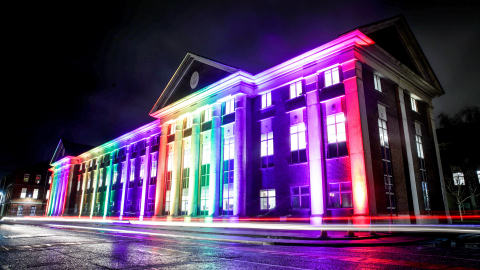Pride Month 2023 - Exploring LGBTQ+ history in the Royal Navy
- View news filtered by: 21st Century
- View news filtered by: Naval Lives
- View news filtered by: Communities
- View news filtered by: Trailblazers
- View news filtered by type: Blog

To commemorate Pride Month the National Museum of the Royal Navy has produced a short series of blogs detailing the long and complicated history of LGBTQ+ service people and the Royal Navy. It is important to be open to discussion regarding this difficult history and recognise the struggles, discrimination, and in some instances danger to life, faced until relatively recently. This is also the time to celebrate on the progress made in LGBTQ+ rights and reflect on the steps it has taken here.
The second of these pieces details the formidable obstacles LGBTQ+ service people faced but also celebrates the incredible progress that has been made by the Royal Navy to transform itself into place of acceptance for peoples of all orientations and identities.
The Queer and Now
For three hundred and ten years the Royal Navy hunted down, persecuted and sometimes even hanged homosexuals found within their ranks. Execution ceased after 1861, but life imprisonment remained a reality. The partial decriminalisation of homosexuality in 1967 did little to sway the opinion of the Armed Forces, and it was not until 2000 that real change was made.
The Royal Navy were not alone in their persecution of homosexuals, or indeed anybody else from within the LGBTQ+ community, but for some there is still the image that they promote an aggressive, macho, alpha-male stereotype.
However, over the past twenty-three years, the Royal Navy has become a beacon of progress and acceptance. In a statement on their website in January 2020, the Royal Navy wanted to send a clear message: “the Naval Service welcomes all talent to its ranks, regardless of your sexual orientation or gender identity” – a far cry from the “gay panic” that gripped Naval officials just forty years previous.
To mark the 20th anniversary of the ban on homosexuals serving in the forces being lifted in 2020, naval bases and Royal Marines units up and down the country flew rainbow flags from their main masts, sailors attended a House of Commons reception and Portsmouth’s Naval Base headquarters was lit up in colours.
Compass
Formerly the LGBT Forum, Compass (the Royal Navy Sexual Orientation and Gender Identity/Expression Network) looks to educate, enthuse, engage and empower current and future LGBTQ+ personnel by improving representation, understanding and visibility. Members of Compass have been able to participate in further training programmes through Stonewall to better understand the experiences of others that differ from their own and to provide support for those who may feel isolated or struggle to “come out”.
Fighting With Pride
Fighting with Pride is a book written by Lt Cdr Craig Jones MBE. Joining the Royal Navy in 1989, he became the first “out” LGBTQ+ person in the Armed Forces, coming out the day the ban was lifted. Jones led the work to restore the Armed Forces Covenant for the serving LGBTQ+ community, and was made a Member of the Order of the British Empire in 2006. Published to mark the 20th anniversary of the ban being lifted, the book features stories from LGBTQ+ service men and women who have served in the Armed Forces since the Second World War.
Fighting With Pride is also a military charity, created on the anniversary of the lifting of the ban. They support “LGBT+ Veterans, serving personnel and their families, particularly those who were affected by the ‘gay ban’…” Craig Jones serves as Joint Chief Executive.
The Royal Navy’s commitment to equality is ongoing, placing them repeatedly in Stonewall’s Top 100 Employers list, and marching as a presence in Pride across the country, while sending representatives to Pride events across the globe.
About the National Museum of the Royal Navy: The National Museum of the Royal Navy have an LGBTQ+ staff network in place, helping to transform the experiences of LGBTQ+ people at work. We provide a space for LGBTQ+ staff and allies to support each other, express concerns they may have, and spend time around people who understand their experiences. The LGBTQ+ staff network feeds into our Equity, Diversity and Inclusion action group ensuring LGBTQ+ staff voices are heard and are considered when developing new policies, processes and initiatives - helping us to become more inclusive.
Glossary
LGBTQ+: Lesbian, gay, bisexual, transgender, queer – the ‘+’ is used to incorporate all other identities such as intersex, asexual, non-binary etc.
Homosexual: Someone who is romantically or sexually attracted exclusively to people of one’s own sex or gender. Historically, this term was used more commonly to refer to gay men than women.
Partial decriminalisation: The Sexual Offences Act of 1967 legalised consensual homosexual acts but was only a partial decriminalisation. Life sentences were scrapped, but acts had to take place behind locked doors and windows, with curtains drawn and nobody else in the house. The age of consent was set at 21 (as opposed to 16 for heterosexual people) and remaining anti-gay laws were policed more aggressively.
Gay panic: Referring to a period in the 1960s where half of the Royal Navy was believed to have “sinned homosexually” – the period in question was linked to a male brothel in Bermuda believed to have been frequented by sailors.
Ban on homosexuality: Homosexuals (including bisexual people in this instance) were banned from serving in the Armed Forces, despite the Sexual Offences Act of 1967, until 2000, when the ban was lifted following a case at the European Court of Human Rights.
Stonewall: The UK’s leading LGBTQ+ charity, taking its name from the Stonewall Riots in New York (1969). The riots were a public backlash against violent policing. They are considered the birth of modern LGBTQ+ activism.